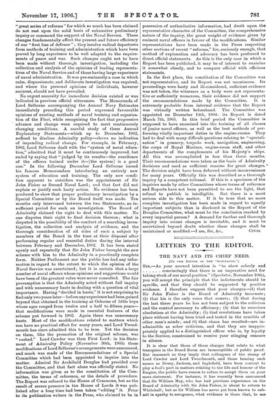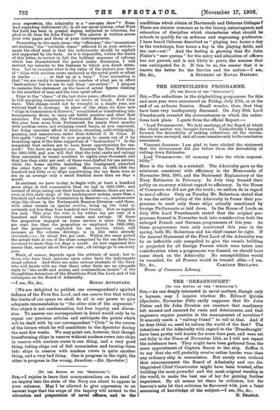LETTERS TO THE EDITOR.
THE NAVY AND ITS CHIEF NEED.
[TO TEM EDITOR Or THE "SPECTATOR.")
SIR,—As your• avowed intention is " to show soberly and convincingly that there is an imperative need for taking stock of our naval position" (Spectator, November 10th), you will accept the principle that the indictments should be specific, and that they should be supported by positive evidence. I therefore suggest that your charges—(1) that Sir• John Fisher• is the Board of Admiralty incarnate ; (2) that his is the only voice that counts ; (3) that during the last three years he has not been subject to the criticism and the control necessary to efficiency; (4) that he exercises absolutism at the Admiralty ; (5) that revolutions have taken place without having been tried and tested in the crucible of other,men's minds ; and (6) that chaos has resulted—are in- admissible as sober criticism, and that they are inappro- priately applied to a distinguished officer who is, by loyalty to the Service, constrained to receive your stinging censure in silence.
It is clear that those of these charges that relate to what transpires in the Board Room are insusceptible of public proof. But inasmuch as they imply that colleagues of the stamp of Lord Cawdor and Lord Tweedmouth, and those bearing such names as Drury, Jackson, and Inglefield, have been content to play a fool's part in matters relating to the life and honour of the Empire, the public have reason to refuse to accept them on your mere statement. For instance, it has recently been announced that Sir William May, who has had previous experience on the Board of Admiralty with Sir John Fisher, is about to return to Whitehall ; but as Sir William has never yet been known to sub- mit in apathy to arrogance, what evidence is there that, to use your expression, the Admiralty is a "one-man show"? None. And regarding indictment (3), in all our naval history, what First Sea Lord has been in greater degree subjected to criticism, for gbod or ill, than Sir John Fisher ? The answer is written across your own pages and those of your contemporaries.
Proceeding to the main issue—the "efficiency," the "momentous revolutions," the "veritable chaos" referred to in your article— again the chief need is that the indictments should be explicit and supported by the facts. As it is impossible, within the limits of this letter, to review in full the brilliant sequence of reforms which has characterised the period under discussion, I will restrict my remarks to the features to which you direct atten- tion. Let us examine what is the value of the picture you draw of " ships with nucleus crews anchored in the naval ports or afloat
in basins or tied up at a buoy." Your accusation is that "we are vastly to increase the number of what are in effect 'land-sailors.' but we are to call them ' sea-sailors.' " I propose to examine this statement on the basis of actual figures relating to the numbers of men and the time spent afloat.
Prior to the "chaos" of the last three years, effective ships not in full sea-going commission had no crews on board. Now they have. This change could not be wrought in a single year, nor without heed to strategy. In place of idle ships, we have now " ships in Commission in Reserve," constituted or constituting into homogeneous fleets, to carry out battle practice and other fleet exercises. For example, the Portsmouth Reserve Division has this year been away from Portsmouth for nearly three months with nucleus crews, not swinging round buoys, as you represent, but doing exercises afloat in tactics, steaming, radio-telegraphy, gunnery, and manoeuvres, under Rear-Admiral C. H. Cross. If this spells "chaos," what do you propose to create out of it by breathing upon it the false suggestion of " land-sailors" ? Is the complaint that sailors are to have fewer opportunities for sea- work ? The facts are against you. Examine the Navy Estimates for 1895-1896, and you will find that the total ranks and ratings then amounted in round numbers to eighty-nine thousand, and that less than sixty per cent. of these were drafted for sea service, while the home service, including the Coastguard, absorbed the other forty or fifty per cent. Moreover, in 1895-1896 the hundred and forty or so ships constituting the sea fleets were at sea on an average only a small fraction more than six days a Month.
In contrast, we have to-day, to begin with, at least a hundred more ships in full commission than we had in 1895-1896; and instead of ships eating out their hearts in idleness, there are now, even in this early stage of the nucleus-crew system, more than a hundred and seventy in Commission in Reserve—i.e., nucleus-crew ships like those in the Portsmouth Reserve Division—and these, with other vessels on special service, bring up the total to certainly not less than four hundred and twenty. Now as regards the men. This year the vote is for within one per cent. of a hundred and thirty thousand ranks and ratings. Of these the proportion engaged on home service is more than five per cent. less than the proportion so employed in 1895-1896, and the proportion employed for sea service, which will increase as the scheme develops, is in like ratio already increased,—i.e., by about five per cent. Within the same period the actual time at sea of the ships comprised by the sea fleets has increased to more than ten days a month. As now organised this means that, except about five per cent., all ratings go to sea every year.
Much, of course, depends upon the attitude of mind ; but to those who base their opinions upon sober facts the indictments stand refuted. And there are some serious students of the Navy who will decide with me that these sober facts are an adequate reply to "the scoffs and scorns, and contumelious taunts" of the thoughtless detractors of the illustrious First Sea Lord, and of his colleagues on the Board of Admiralty.
[We are delighted to publish our correspondent's spirited defence of the First Sea Lord, and can assure him that within the limits of our space we shall do all in our power to give adequate representation to " the other side of the argument." Our object is not condemnation, but free inquiry and discus- Sion. To answer our correspondent in detail would only be to repeat our previous articles and anticipate the points which will he dealt with by our correspondent " Civis " in the course of the letters which he will contribute to the Spectator during the next few weeks. We may point out, however, that though transforming ships in reserve without nucleus crews into ships in reserve with nucleus crews is one thing, and a very good thing, taking ships out of full commission and turning them into ships in reserve with nucleus crews is quite another thing, and a very bad thing. One is progress in the right, the other is progress in the wrong, direction.—ED. Spectator.]



























































 Previous page
Previous page